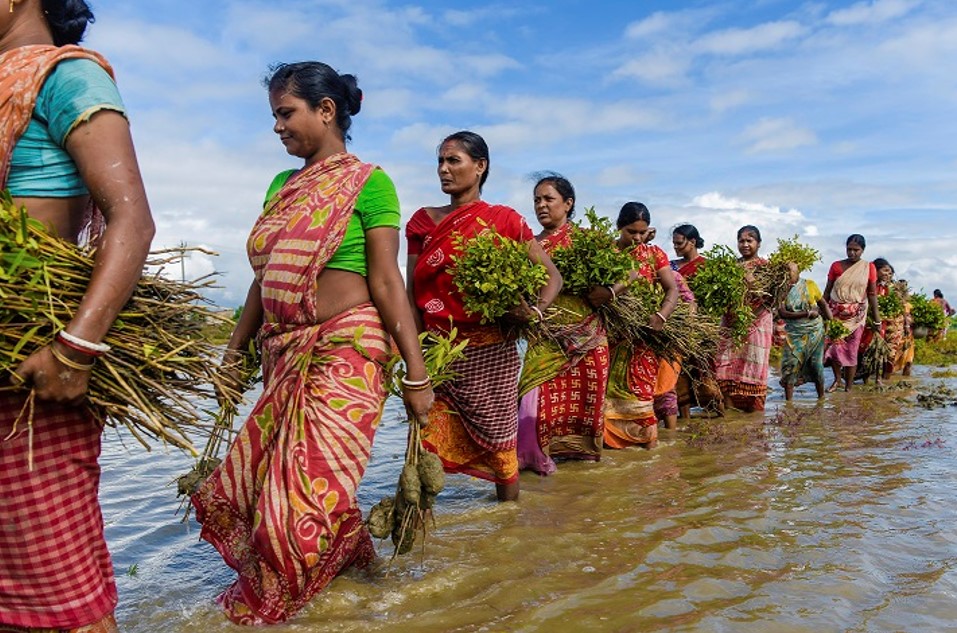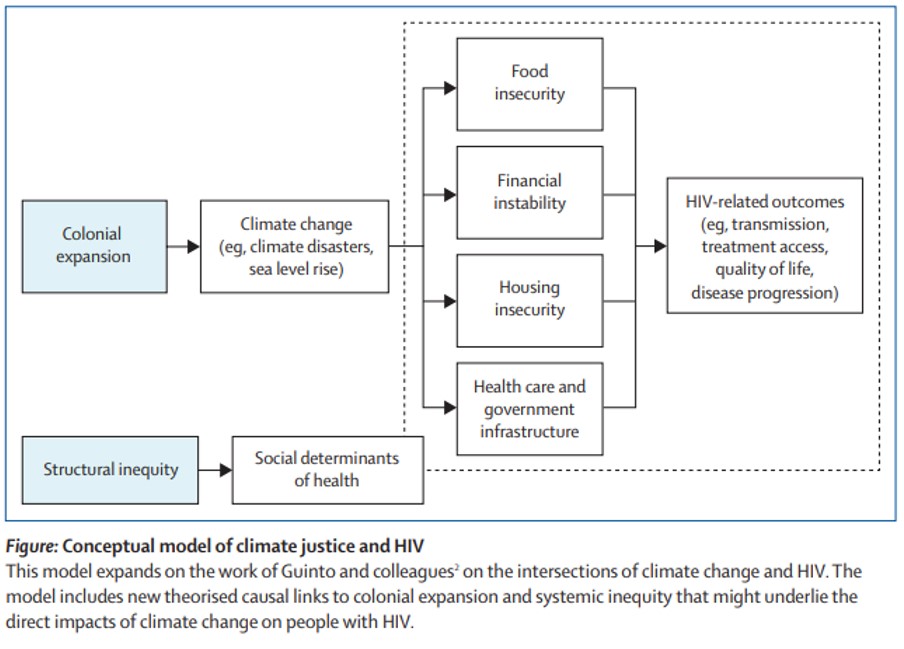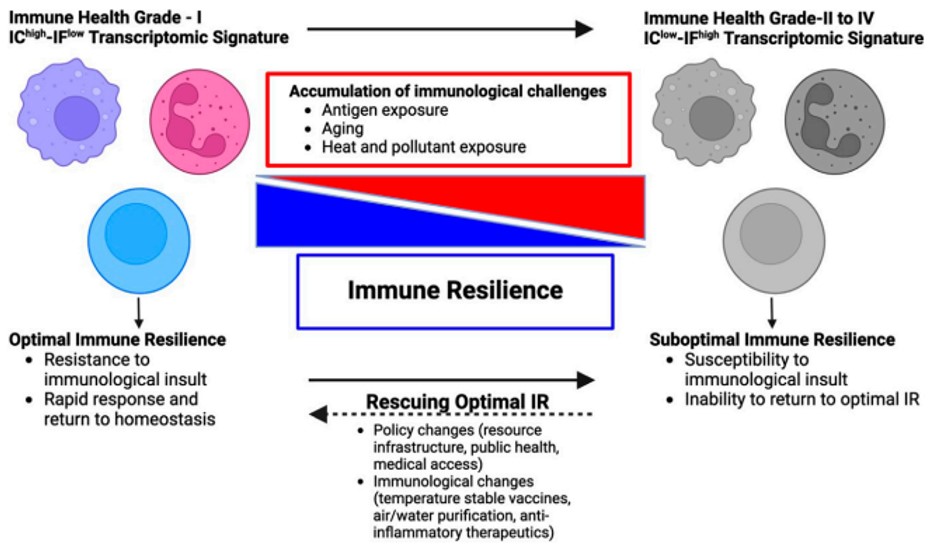"The year is barely halfway over and extreme weather events have dominated headlines around the globe. Frightening floods pestered Pakistan; terrible tornados terrorized the Midwest United States. For 421 straight days, an unprecedented heat wave scorched the North Atlantic Ocean. While writing this piece, Hurricane Beryl paved a path of destruction from the Caribbean to Canada.
Climate change is an existential crisis–one that not only threatens weather patterns and biodiversity, but marginalized communities with limited access to quality healthcare. Here are three ways climate change is endangering the HIV/AIDS fight, in particular." Read more from "Warming Planet Threatens to Chill AIDS Fight".
A recent article in Forbes by President and COO of (RED), Jennifer Lotito, highlights the threats that climate change poses specifically to our efforts to fight HIV and AIDS worldwide.
Duke's Climate Commitment is a university-wide, impact-oriented initiative to address the climate crisis by creating sustainable and equitable solutions that place society on the path toward a resilient, flourishing, carbon-neutral world.
The Duke CFAR has been leading discussions to shed light on the disproportionate impacts of climate change on people living with HIV, nations in the Global South, and individuals with minoritized identifies. CFAR investigators have recently come together with others from across Duke (including the Nicholas School of the Environment, Pratt School of Engineering, and Duke Global Health Institute) and in the community (including collaborating with Dr. Chris Hawn of the North Carolina Environmental Justice Network), to publish articles and commentaries shedding light on this important and dire topic.

Dr. Keith Reeves helped lead the coordinated efforts of two commentaries. As he shares, "Climate change is one of the greatest threats to overall human health, but current models don’t always evaluate the intersection with structural inequity, social determinants of health, nor do they consider individual health at the cellular and molecular level, such as immune health resilience. Recent evaluations by multiple members of the Duke CFAR as well as CHSI and DGHI are leading efforts to understand the disparate impacts climate change may have on persons living with HIV, since the time is now to consider equitable interventions and solutions for both preserving health and access to care."
Intersectional climate justice, health equity, and HIV.
Wilson SM, Woolley G, Hawn C, Hoffman K, Jones AD, Chan C, Mudrak SV, Qureshi MU, Ward A, Knippler ET, Okeke NL, Corneli A, Tomaras GD, Reeves RK.
Lancet HIV. 2024 May;11(5):e280-e281. doi: 10.1016/S2352-3018(24)00062-6.
Current models of climate change and HIV acknowledge the impact of social determinants of health (eg, geographic location, socioeconomic status) but do not include theorised causal pathways linked to systems-level influences. Nations in the Global South (eg, sub-Saharan African, South American, and southeast Asian countries) and individuals with minoritised identities face a disproportionate burden of the HIV syndemic (ie, the way that HIV interacts with other infectious diseases and health concerns to yield increased health burden). These populations also face inequity related to current and future climate change impacts. We argue that this is not a coincidence. In this Comment, we expand on one current model of climate change and HIV by including the legacy of racist colonial expansion and ongoing systemic inequity.

The Climate Change Burden on Immune Health: Are Persons Living with HIV More at Risk?
Woolley G, Kroll K, Hoffman K, Ward A, Corneli A, Mudrak SV, Qureshi MU, Okeke NL, Chan C, Jones AD, Tomaras GD, Reeves RK.
AIDS Res Hum Retroviruses. 2024 May 27. doi: 10.1089/AID.2024.0050.
Climate change poses one of the most significant modern threats to overall human health, especially for vulnerable populations including persons living with HIV (PLWH). In this perspective, we specifically explore the concept of immune resilience in human health and how climate change phenomena - including extreme weather events, food insecurity, pollution, and emerging diseases - may exacerbate immune dysfunction and comorbidities faced by PLWH and hinder access to HIV treatment and prevention services. Multidisciplinary, collaborative efforts are urgently needed to quantify these impacts, develop mitigation strategies, and strengthen policies and funding to bolster immune resilience for PLWH in the face of accelerating climate change.

Climate change poses dire health and human rights risks.
Chris Beyrer.
360info. 2024 April 24. doi: 10.54377/2eff-10fa
Climate change has not traditionally been seen as a health and human rights concern — but that may be changing following recent high-profile court cases.
On April 9 the European Court of Human Rights ruled in favour of a group of elderly Swiss women who claimed the government’s inadequate efforts to combat climate change put them at risk of dying during heatwaves. And in India, the Supreme Court on April 6 recognised a right against the adverse effects of climate change as a distinct fundamental right in the Constitution. In that judgement, one of the judges said the rights to life and equality couldn’t be fully realised without a clean, stable environment. The court also highlighted the connection between climate change and the right to health.
The World Health Organization has declared climate change to be the greatest threat to health that humanity faces.
Since climate change affects so many aspects of our lives, its effects on health and health care are complex, multiple, and highly variable across geographies, ecozones and development levels. There are direct impacts on our bodies and communities, such as have emerged with extreme heat, droughts, floods, fires and other climate change-driven catastrophic events.
There also are more complex and indirect impacts, such as increasing food insecurity, the rising threat of infectious diseases, increased exposure to water and air pollutants, the health impacts of forced mobility and migration, and the mental health and social impacts of the climate crisis that affect us on our deepest levels.
Yet climate change has not traditionally been seen as a health and human rights concern — a reality which, arguably, needs to change.
In a report published last month in The Lancet, ‘Under threat: The International AIDS Society-Lancet Commission on Health and Human Rights’ we suggested several pathways through which climate change bears on the right to health.